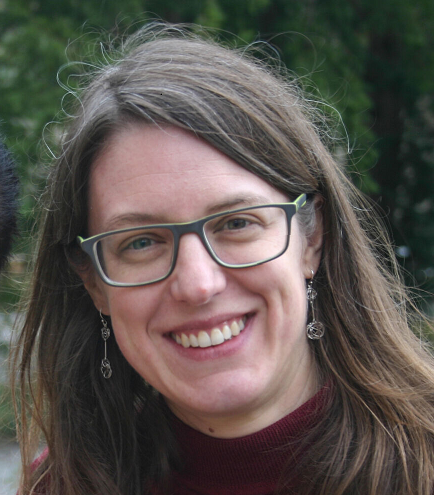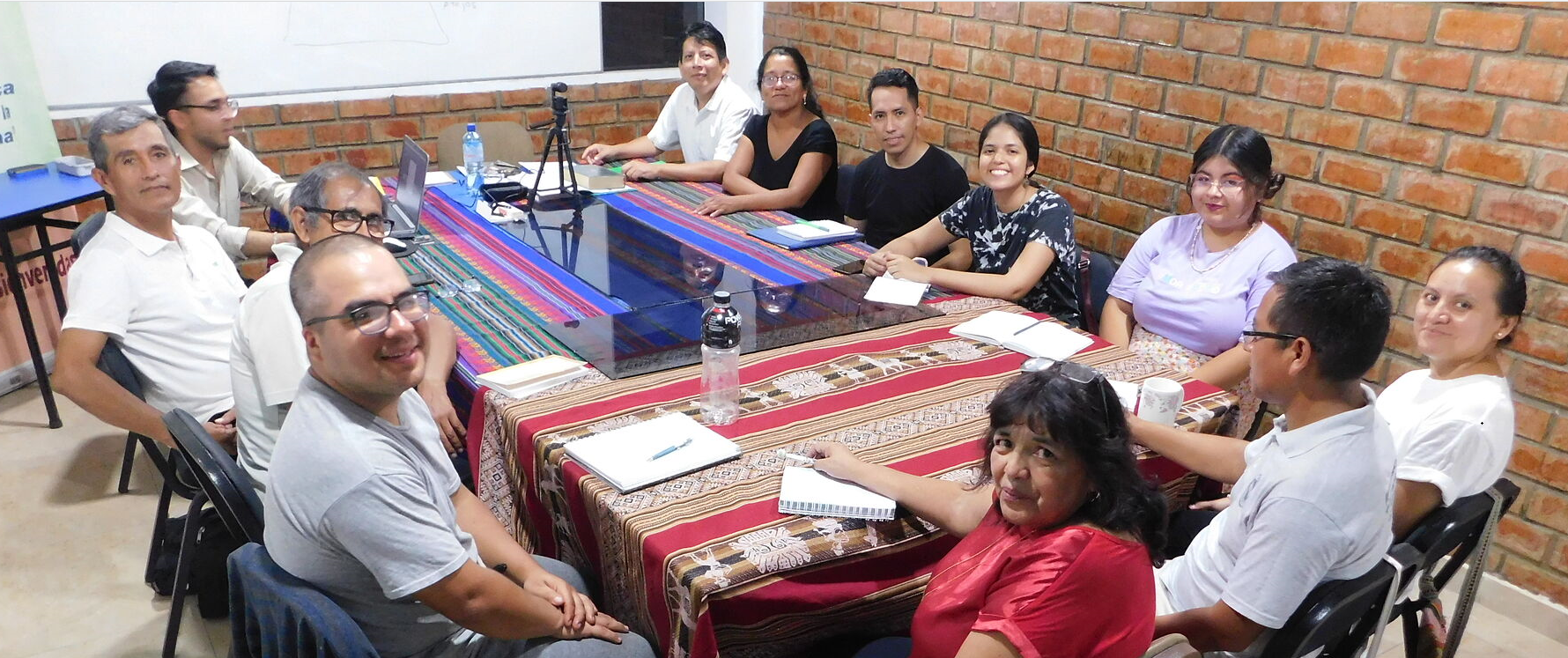
Simone Dollinger
Program Manager Latin America
Education, religion and development

Project Number: 400.1020
Latin America is becoming increasingly pluralistic in religious terms. At the same time, politico-religious fundamentalism, which undermines democracy and the rule of law, is growing at an alarming rate. These conservative religious groups are well anchored in the political party system of various nation states and are in close dialog with the conservative media and economic and political elites. They often spread messages that are directed against women's rights, particularly in the area of reproductive health. They also discriminate against indigenous population groups and LGTBQI people and prevent effective measures against climate change.
Against this backdrop, education and training in the field of theology has become increasingly important, as conservative church circles are also spreading fundamentalist messages. In this increasingly hostile climate of exclusion and intolerance, Mission 21's partner organizations in Latin America are committed to providing sound theological education and training that enables participants to take on responsibility in society and the church. They are committed to the social inclusion of those who think differently and of ethnic and social minorities and communicate the urgent need for action in matters of environmental justice.
The Latin American Bible University (UBL) is a theological university in San José, Costa Rica. In its educational work, UBL promotes awareness of gender justice, environmental issues and alternative economic models that are oriented towards a "good life" for all. Its principles are ecumenical openness, holistic spirituality, commitment to peace and a special sensitivity towards the ethnic diversity of Latin America. Committed to contextual theology, the UBL decided two years ago to make "planetary life" a new key aspect of teaching, research and community life. To this end, UBL was certified as a Green Seminary in 2020. UBL's educational offer is open to everyone and is aimed at people throughout Latin America. The Documentary film on the occasion of the 100th anniversary in 2023 provides an insight into the liberation theology profile of the institution, which is committed to justice.
The Ecumenical Training Center "Departamento Ecuménico de Investigaciones" (DEI) in San José, Costa Rica, works in the fields of education and supporting human rights defenders. The starting point is the conviction that theology must be in exchange with other fields of knowledge. The seminars deal with interdisciplinary issues from theology, economics, environmental and social sciences. The DEI draws its inspiration from Latin American liberation theologies and is committed to the protection of human rights defenders.
The "Asociación Educativa Teológica Evangélica" (AETE) is a training center for evangelical-ecumenical theology in Peru. It trains full-time pastors as well as volunteers and religiously interested people for church and social commitment. Among other things, the ability to initiate processes of change in the respective environment is imparted. AETE was first founded by Protestant churches from the ecumenical environment as a Peruvian branch of the Latin American Bible University UBL in Costa Rica. Since 2012, it has been functioning independently of UBL.
The theological institute "Seminario Andino San Pablo" (SASP) offers basic theological training as well as university theological training. The university training is aimed at future pastors and takes place in collaboration with the Universidad Biblica Latinoamericana (UBL) in Costa Rica. SASP is based in the city of Huancayo in the Peruvian Central Andes. One of the main focuses of the SASP is the promotion of women and intercultural dialogue. To this end, the Institute conducts theology courses in communities in the nearby rainforest, as well as in the Central (Cerro de Pasco and Huanuco) and Southern Andes (Puno, Apurimac).
In the Latin American context, theological educational institutions that are committed to contextual liberation theology teaching and research make an important contribution to the social inclusion of socially marginalized and vulnerable population groups (SDGs 10.2 and 16.7). The aim is to provide students with a sound theological education and training that enables them to take on responsibility in society and the church.
Ecumenism, interculturality, environmental and gender justice are important cross-cutting themes during training. The institutions particularly promote the training and further education of women, who are still underrepresented in leadership positions and discriminated against by a misogynistic interpretation of the Bible, among other things.
The educational opportunities offered by our partners are open to anyone interested in a theological training or further education program.
The Casa DEI" protection center is aimed at threatened human rights defenders from all over Latin America and the Caribbean.
Our partner organizations implement the following activities in their projects:
The UBL offers comprehensive virtual theology studies with a state-recognized degree (licentiate in biblical studies or theology) for students from all over Latin America. It is possible to specialize with a Master's degree in Religion, Gender and Diversity or in Theology and Interculturality in collaboration with the National University of UNA.
The DEI organizes an annual four-week intensive course on a current socio-political topic. This offers participants the opportunity to analyze mechanisms of violence, discrimination and exploitation of people and the environment in Latin America and to derive impulses for their own commitment. In addition, the DEI runs a protection program for threatened human rights defenders, the "Casa DEI". The program includes accommodation, meals and psychosocial support as well as further training courses to strengthen resilience and clarify future prospects.
AETE promotes self-determination and leadership skills by offering low-threshold courses for women from local, mostly conservative church communities in Lima, Chiclayo and Cajamarca. An important aspect of the courses is the prevention of gender-specific violence. To this end, AETE deliberately relies on workshop leaders who are familiar with the religious and church context and are respected by pastors. AETE thus makes an important contribution to the prevention and removal of taboos surrounding violence against women in churches and, if necessary, also arranges professional help for those affected by violence. AETE also offers a diploma course on Latin American theology and pastoral care and further training courses.
The SASP is closely linked to the UBL and provides students with a foundation course in Bible and theology and a diploma course aimed primarily at women involved in the church. The SASP pays particular attention to the pedagogical placement and support of participants, as they often come from very conservative churches. Thanks to an agreement with the UBL, particularly interested students can continue their studies and obtain a state-recognized degree.
In 2024, a total of 994 people took part in the theological education programmes, including workshops on the prevention of gender-based violence, run by our five partner organizations in Costa Rica, Peru and Chile. A total of 799 people took part in the specific theological programs, including 448 women, 343 men and 8 people with a different gender identity. This corresponds to 56% women. The most important activities were the implementation of theological university programs, low-threshold theological courses and the production and publication of teaching material, podcasts (34 episodes) and publications (9 magazines and 2 books) on theological and social topics. The university programs offered a total of 144 courses at Bachelor's, Licentiate and Master's level. All of these programs included specific courses in theology and gender and included climate justice and gender justice as cross-cutting themes. The courses were mostly held virtually and reached students from different Christian denominations and countries in Latin America and the Caribbean. The other theological courses and workshops were mostly held on-site and comprised 123 training sessions. For example, AETE, SASP and CTE offered diploma courses with a focus on strengthening the leadership role of women and youth in the churches, including workshops on the prevention of sexual and gender-based violence in disadvantaged urban and rural areas in Peru and Chile.
104 women and 123 men took part in the UBL courses. In addition to the 44 academic courses, UBL also sensitized participants through numerous workshops, public seminars, publications and podcasts on environmental issues, gender-based violence, LGTBQI+ and migration. 88% of the women and 89% of the men report that they are able to work more specifically on social and pastoral challenges in their parishes, Christian educational institutions and organizations. The graduates have acted as multipliers. They say that they are better able to link the biblical-theological knowledge they have acquired with concrete realities and can therefore drive forward small change processes in their congregations. It is also pleasing that Mission 21's second PEP assignment in a row has now been carried out by a young specialist in agronomy in UBL's agroecological community garden and that the next specialist will be leaving in April 2025.
54 women, 38 men and 8 other people with a different gender identity took part in DEI's course program. For the first time since the pandemic, the two seminars on authoritarianism and democracy in Latin America and the seminar on a similar topic with a biblical focus were once again held as face-to-face courses with participants from 16 Latin American countries. The increasingly religiously conservative and even fundamentalist environment has prompted DEI to launch a podcast on religion and human rights. In 2024, Diálogos impensados (Unthinkable Dialogues) received 868 views. The number of listeners on Spotify increased by 38 % and the number of followers on other platforms by 18 %. They come from 11 countries.
Participants say that living together with people from different backgrounds at DEI during the seminars was an important learning experience for them. They can now express themselves better, experience a better relationship with their bodies (self-care) and biblical texts have opened up to them anew thanks to a critical and liberating hermeneutic. They stated that they felt better trained and empowered to face the challenges in their field of work.
43 women and 62 men took part in the theological course programs. AETE also carried out specific activities to prevent gender-based violence in parishes in poverty-stricken areas of the capital Lima, Cajamarca and Lambayeque. Thirty-three girls, 23 boys, 11 men and 128 women took part.
At the end of the diploma courses "New models of youth ministry and political engagement in the context of violence", the participants passed on the knowledge they had acquired in workshops in their communities, reaching a further 230 people. The young people say that the courses have encouraged them to question their previously apolitical stance and have now, for example, joined the actions demanding justice for the people and their relatives who were murdered or injured during the social protests at the beginning of 2023.
115 women and 60 men took part in the theological course programs. This high participation of women from different denominations is a success in the conservative Peruvian highlands and is an indication that women are encouraged to play an active role in their communities. Participants report that they are actively involved in pastoral work.
132 women and 60 men took part in CTE theology courses and workshops in Chile, which represents a high level of participation. A total of 66 courses were held in the Bachelor and Licentiate programs. Events such as a two-day workshop aimed at Protestant women with leadership responsibilities or a certificate course on feminist theology resulted in a higher number of women being reached. Due to a stronger focus on Mission 21's programme work, cooperation with the partner organizations in Chile was terminated at the end of 2024.
See here the Film celebrating the 100th anniversary of our partner organization UBL

To the podcast "Voices of hope", Episode "Casa DEI - we protect people who defend our rights"


CHF 207'000
Mission 21
Protestant Mission Basel
PO Box 270
Missionsstrasse 21
4009 Basel, Switzerland
Tel.: +41 (0)61 260 21 20
info@mission-21.org
Donation account Switzerland:
IBAN: CH58 0900 0000 4072 6233 2
Tax exemption number:
CHE-105.706.527
Donation account Germany:
Savings Bank Lörrach-Rheinfelden
Swift BIC: SKLODE66
BLZ: 683 500 48
IBAN: DE39 6835 0048 0001 0323 33
Account No. : 1032333